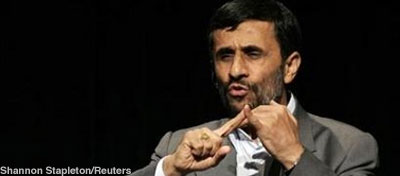
I listened to President Ahmadinejad’s speech today at Columbia University. There are several correspondents, reporters, journalists and analysts who have covered the story and shed light on the different aspects of this encounter. Some still blame Columbia University and some now are worshipping its President Lee Bollinger for his bluntly critical introduction.
Some reporters are already manipulating the quotes and words to transfer an impression that did not exist in President Ahmadinejad’s words. Some are asking themselves if Ahmadinejad actually extended an olive branch to the United States. He sure invited all Columbia faculty to visit Iran– I would cash in on that before the next election if I were a member of Columbia’s faculty.
President Ahmadinejad cannot help it, he says controversial things. About him truthfully Masoud Behnoud, Iranian veteran journalists, says: “He has great dreams and little correctness.” His remarks include funny ones, simple ones, political ones and a few unintelligent ones. However he certainly did not say some of the things that are making the headlines across the world right now.
Unlike Associated Press writers, any Farsi speaker or listener for that matter understood that he was inviting his audience to look into “roots” and “causes” of 9-11 to prevent such events. He asked them to ask “why did it happen?” He asked several questions of the same nature without questioning the official version. He asked his audience to ask themselves “who were truly responsible for this event?” Responsibility is indeed a broad term. I did not get the impression that he was questioning 9-11. To give that impression to a global audience when it was not intended is not called professional journalism. It is called political propaganda.
On the Holocaust, he was also much softer and much more realistic than before. He did not apologize, which many people wanted and want to hear him do. He did however emphasize a point that is not well understood in the West and often goes unnoticed. Most Middle Easterns and Arabs believe Western countries’ support for Israel and their ignorance of the Palestinian predicament is rooted in their role in the Holocaust. They believe these countries are trying to compensate for the crimes against the Jewish people in Europe at the Palestinians’ expense. It is up to scholars and intellectuals to show this is not the case.
On Israel, he repeated the official line of held by all Iranian governments for the past decade. Iran accepts whatever the Palestinian people choose in a free referendum. That is far better than changing the global map. Here he obviously was re-tracking his previous statements and trying to soften the image of his government. This also was the same line that President Khatami advocated when he was the president. He did extend an olive branch, saying that Iran and the USA could be great friends. He said that twice to make sure he has made his point. In this, I believe he was sincere. He did not budge to any question regarding war by accepting the possibility of a military confrontation. For him it seems war is not an option on the table.
Overall in his third visit it seems that President Ahmadinejad is adopting some of his reformist predecessor President Khatami’s lines and ideas; his emphasis on brotherhood, peace, common Abrahamic ground and avoiding tough talk of war. His finest moment was when he talked about Iran and the USA as friends. His worst one was when he said that there are no “homosexuals” in Iran. He was obviously not prepared for that question. His remarks on women’s rights and freedom were well prepared, but that standing exists only in his mind. Thousands beg to disagree with him on his assessment of the social situation in Iran.
It is a pity that his talk came after the events of the last 2 and half years. He would be taken much more seriously, if it were not for his naïve remarks on the Holocaust and his government’s human rights record. And although he claims to be and he is an academician, he lacks that intellectual impression that President Khatami radiated.
To soften his image President Ahmadinejad has a long way to go; more freedom at home, less rhetoric remarks and more actual results. He has to climb an even higher wall of mistrust, which many are helping to build daily, motivated by their fear and interests in having an isolated Iran to be blamed for the failure in Iraq and to which he, himself, is adding through his mishandling of media. It is not an easy task, but it does not seem to scare him.






